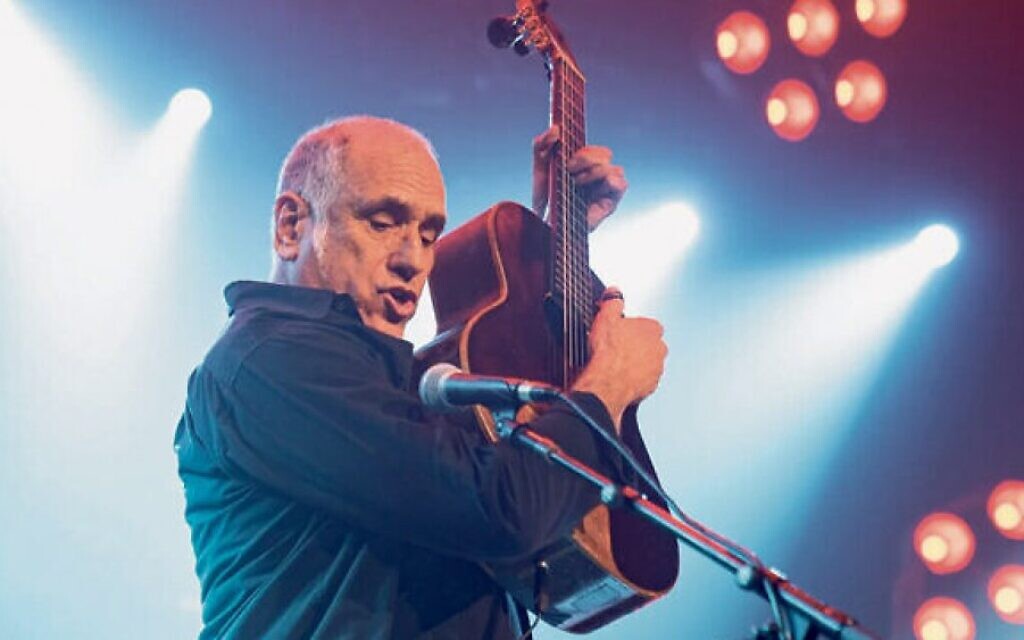New York Jewish Week – When Gady Levy, the executive director of the Emanu-El Streicker Center synagogue, approached Israeli singer-songwriter David Broza to compose new music for the Friday night Shabbat service, the musician was skeptical.
My first reaction was to say, “I don’t think I’m the right person – someone else who knows prayer better will be more adequate,” David Broza told New York Jewish Week. For a secular Israeli like him, Friday night was for family meals, not the hour-long meditative service in the synagogue known as Kabbalat Shabbat.
But like many artists confined during the pandemic, Broza realized that being stuck at home forced him to think outside the box.
Receive our free daily edition by email so you don’t miss any of the best news Free registration!
“Once I opened the email [de Levy] and started reading the prayers, I was immediately inspired by so much poetry,” the 66-year-old Broza said. “I took my guitar, I sat down in front of the prose; my muse immediately began to inspire me. It only took me 14 days to compose the 14 prayers. »
Thus “Tefila” was born, a new music album for Kabbalat Shabbat, as well as the centerpiece of a new Friday night service experience at Emanu-El aimed at attracting a new audience from May 6. . The Streicker Center, the educational and outreach arm of New York City’s First Reform Congregation and its largest synagogue, tapped David Broza for what Levy calls a chance to ‘re-envision’ Shabbat for a cohort who otherwise might not come to the synagogue.
“I like that David doesn’t come from a religious background,” Levy said. “We thought it would allow him to look at things from a different perspective, and we let him. »
“Tepilah,” which means “prayer” in Hebrew, offers new settings for some of the most familiar prayers and hymns in the Jewish liturgy — and, for synagogue regulars, some of the most sacrosanct. The melodies heard at a typical Friday evening service can range from hazzanutor cantoral music, of European origin, with the airs and folk accents of the composers of the end of the 20th century, Debbie Friedman and Shlomo Carlebach.
When asked if he studied any part of this canon, Broza replies that he focused on the essence of the prayer text.
“From the start, I immersed myself in poetry, prayers; I intended to write new melodies for these traditional prayers, some of which have very old melodies,” he said. “The Hebrew script literally enlightened me and guided me to new musical places. »
For audiences outside Israel, Broza can be compared to the American artists he performed and collaborated with such as Jackson Brown, Steve Earle or the late cult country songwriter Townes Van Zandt.
But on more than 40 albums, he ventures outside singer-songwriter territory to explore world music.
“Tefila” is a repertoire of these influences, which begins with a “Shalom Aleichem” with bossanova accents. “Barchu” begins with a bullfighting trumpet (Broza has released several albums in Spanish) and quickly veers towards free jazz. Her “Lecha Dodi” – a “Sabbath Bride” greeting that is perhaps the emotional highlight of the Friday evening service – sounds like a journey from flamenco to Bertolt Brecht to the Broadway stage.
“In accepting this project, I envisioned an hour-long set of prayers that would captivate audiences,” Broza said.
In addition to Broza on guitar and vocals, the 25-voice Moran Choir from Israel, gospel singers from New York and, on bass, Israeli-American Omer Avital, who also performed the orchestrations, participated in making the album.
“I wanted it to be inspiring for me and therefore for the audience,” Broza said.
“Tefila” and the Friday Night Hub project are part of a major new initiative by Emanu-El to reach new audiences: Shortly before his death in March, the outgoing synagogue president, John Harrison Streckerdonated $10 million that added to the already existing fund of $15 million for efforts to reach Jewish youth, unaffiliated families, and other people Levy calls “the curious.”
The rabbinate has validated the project, and Rabbi Joshua Davidson of the Emanu-El Synagogue will take part in the Hub.
I hope people call me and say, ‘I can’t believe it’s Friday night,’ said Levy, who added that to some ‘curious’ folks, the traditional synagogue may seem like a place. frightening “. “What we really want to do is what every organization has been trying to achieve for a long time, which is to push people who wouldn’t otherwise go to a Jewish event, a social event that is also a service. »
Although Broza – who splits his time between New York and Tel Aviv – will lead many of the Friday Night Hubs, Levy hopes the project will expand beyond a single interpreter or a single synagogue.
“My goal is to have other synagogues around the country use this music as well,” and for free, Levy said. “I hope David will travel and allow other synagogues to use his melodies. If we succeed, it will be everyone’s success. »
The first Friday Night Hub, aimed at people between the ages of 21 and 39, will take place on May 6 at 8 p.m. at the Emanu-El Synagogue, 1 E 65th Street in Manhattan. To the sound of David Broza’s album, worshipers can enjoy a Shabbat oneg prepared by Israeli-American chef Michael Solomonov and an appearance by songwriter Emily Bear, whose “The Unofficial Bridgerton Musical” won the Grammy Award for Best Musical Theater Album.
Registration and full vaccination pass required. For more details, click ici.
–


